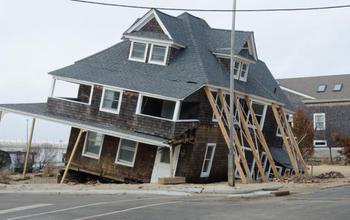 Credit and Larger Version |
September 27, 2013
More than half the world's human population lived in coastal areas in the year 2000; that percentage is expected to rise to 75 percent by 2025.
With our large footprint in coastal sands--and in the wake of severe storms such as Hurricane Sandy--how do we co-exist with our coastlines? How do we use them sustainably?
A sustainable world is one in which human needs are met equitably, without sacrificing the ability of future generations to meet their needs. The National Science Foundation (NSF)'s Science, Engineering, and Education for Sustainability investments aim to address this challenge.
NSF's coastal SEES program is focused on the sustainability of coastal systems: the swath of land closely connected to the sea, including barrier islands, wetlands, mudflats, beaches and estuaries, as well as coastal cities, towns, recreational areas and maritime facilities; the continental seas and shelves; and the overlying atmosphere.
NSF's coastal SEES program has funded its first awards for studies of coasts in the U.S. and around the world. The 11 awards total $13.1 million.
Coastal systems are crucial to regional and national economies. They host human-built infrastructure and provide ecosystem services that sustain our well-being, says David Conover, director of NSF's Division of Ocean Sciences.
"We benefit from coastal environments for enjoyment, housing, food, industrial uses and commerce," says Conover. "In the process, however, we alter them physically, chemically and ecologically."
"These changes influence and interact with natural variability, extreme events and long-term directions to affect the system as a whole, including the benefits humans derive."
We need to better comprehend this coupled human-natural system, he says, so we might make better decisions about its future.
Toward that end, NSF's new coastal SEES projects address topics such as developing high-performance green infrastructure to sustain coastal cities; sustainability of the largest estuary in the U.S., Chesapeake Bay; planning for the hydrologic and ecological effects of sea level rise on coastal water resources; brine discharge from desalination plants; achieving sustainable urban estuaries; and the resilience of coral reefs.
2013 Coastal SEES Awards
Patricia Culligan, Columbia University:
Wayne Geyer, Woods Hole Oceanographic Institution:
Thomas Fisher, University of Maryland Center for Environmental Sciences: Coastal SEES (Track 2), Collaborative: Improving Chesapeake Bay water quality by creating sustainable coastal watersheds
Andrew Pershing, University of Maine:
Christopher Hein, College of William & Mary Virginia Institute of Marine Science:
Carl Hershner, College of William & Mary Virginia Institute of Marine Science:
Sally Holbrook, University of California-Santa Barbara:
Jonathan Martin, University of Florida:
Steven Murawski, University of South Florida:
Coastal SEES (Track 1): Novel approaches to understanding human use patterns and mobility for coastal natural resources management
Adina Paytan, University of California-Santa Cruz:
Adina Paytan, University of California-Santa Cruz:
Coastal SEES (Track 1): Brine discharge from desalination plants--Impacts on coastal ecology, public perception, and public policy
Tamara Ticktin, University of Hawaii:
Tamara Ticktin, University of Hawaii:
-NSF-
Media Contacts Cheryl Dybas, NSF (703) 292-7734 cdybas@nsf.gov
Related WebsitesNSF's Science, Engineering and Education for Sustainability programs: http://www.nsf.gov/sees
NSF Publication: Discoveries in Sustainability:
NSF Publication: Discoveries in Sustainability:
The National Science Foundation (NSF) is an independent federal agency that supports fundamental research and education across all fields of science and engineering. In fiscal year (FY) 2012, its budget was $7.0 billion. NSF funds reach all 50 states through grants to nearly 2,000 colleges, universities and other institutions. Each year, NSF receives about 50,000 competitive requests for funding, and makes about 11,500 new funding awards. NSF also awards about $593 million in professional and service contracts yearly.
Useful NSF Web Sites:
NSF Home Page:
NSF Home Page:
http://www.nsf.gov
NSF News:
NSF News:
http://www.nsf.gov/news/
For the News Media:
For the News Media:
http://www.nsf.gov/news/newsroom.jsp
Science and Engineering Statistics:
Science and Engineering Statistics:
http://www.nsf.gov/statistics/
Awards Searches:
Awards Searches:
The National Science Foundation (NSF)
Guillermo Gonzalo Sánchez Achutegui







No hay comentarios:
Publicar un comentario